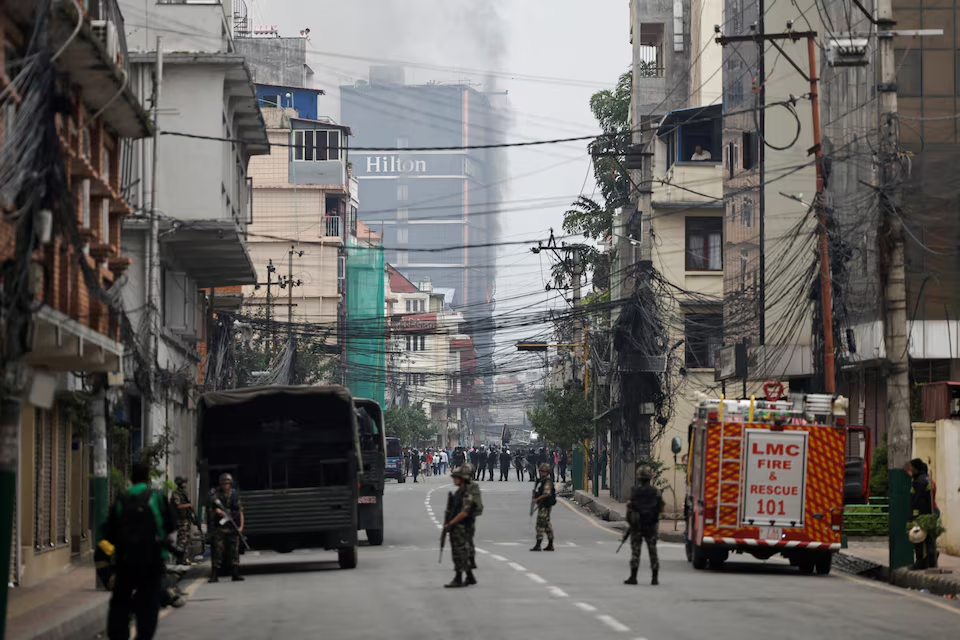News
Troops Deployed to Guard Nepal’s Parliament Amid Deadly Protests

Soldiers patrolled the streets and guarded Nepal’s parliament in Kathmandu on Wednesday as the capital remained under curfew following two days of deadly anti-corruption protests that forced Prime Minister K.P. Sharma Oli to resign.
The unrest in this impoverished Himalayan nation began last week after a ban on social media platforms sparked outrage. The protests escalated when police fired tear gas and rubber bullets to control crowds on Monday, resulting in the deaths of 19 people. The ban was later lifted amid nationwide anger.
According to Nepal’s Ministry of Health, the death toll had risen to 25 by Wednesday, with 633 people injured in the protests.
Around the parliament area, charred vehicles and twisted metal lay scattered as firefighters struggled to extinguish flames inside the main hall. Protesters had set the building’s exterior ablaze on Tuesday, causing extensive damage.
Television footage showed young volunteers cleaning damaged buildings and clearing debris from the roads and parliament surroundings.
“I’ve been informed by the security chief that the fire has destroyed the entire infrastructure. Nothing remains,” Ekram Giri, spokesperson for the lower house of parliament, told Reuters from his home in Kathmandu.
Several other government buildings, including the Supreme Court, ministers’ residences, and Prime Minister Oli’s private home, were also set on fire during the unrest, which only subsided after his resignation.
With shops and markets shut, armored vehicles patrolled the mostly deserted streets. Army spokesperson Raja Ram Basnet confirmed that firefighters had been deployed at multiple locations, while efforts to clear roads continued.
“We are trying to normalize the situation first. We are committed to protecting people’s lives and property,” Basnet said, adding that prisoners had set fire to the Delhi Bazar jail in Kathmandu before the army could fully restore order.
The capital’s main airport reopened on Wednesday after being shut for more than 24 hours, an airport spokesperson confirmed.
In a post on X, the army announced that curfew orders would remain in force until Thursday morning.
“Any form of protest, vandalism, looting, arson, or attacks on individuals and property under the guise of protests will be treated as a punishable offense, and strict action will be taken by security forces,” the statement read.
The army also said that relevant parties were coordinating to address the post-protest situation and find solutions, while media reports indicated that talks between authorities and protest leaders were being arranged, though details remained unclear. Reuters was unable to independently verify these reports.
Former Supreme Court judge Balram K.C. urged protesters to form a negotiation team with the army’s assistance in restoring law and order, and called for new elections.
A constitutional expert told Reuters, “The parliament should be dissolved and new elections conducted. Discussions should be held to form the next caretaker government.”
Most protesters were young people expressing frustration over the government’s failure to combat corruption and promote economic opportunities, leading to the demonstrations being dubbed “Gen Z protests.”
For years, job shortages have forced millions to seek work in countries like Malaysia, the Middle East, and South Korea, particularly in construction sites, to send money back home.
Among the injured, 20-year-old Suman Rai, heavily bandaged on his head and left wrist, lay in a hospital bed saying, “If shedding blood today is good for our future, then participating in the protests was worth it.”
Since the end of the monarchy in 2008 following mass protests, Nepal — sandwiched between India and China — has struggled with political and economic instability.
In a statement, Nepal’s last monarch, King Gyanendra, condemned the killings and injuries, saying, “It is utterly reprehensible to take the lives of hundreds and injure so many without addressing the genuine demands of the youth. This goes against the values of Nepal’s peaceful society.”
In a post on X, Indian Prime Minister Narendra Modi urged Nepali citizens to maintain peace and order, while Beijing expressed hope that social stability and national order would be restored as soon as possible.
